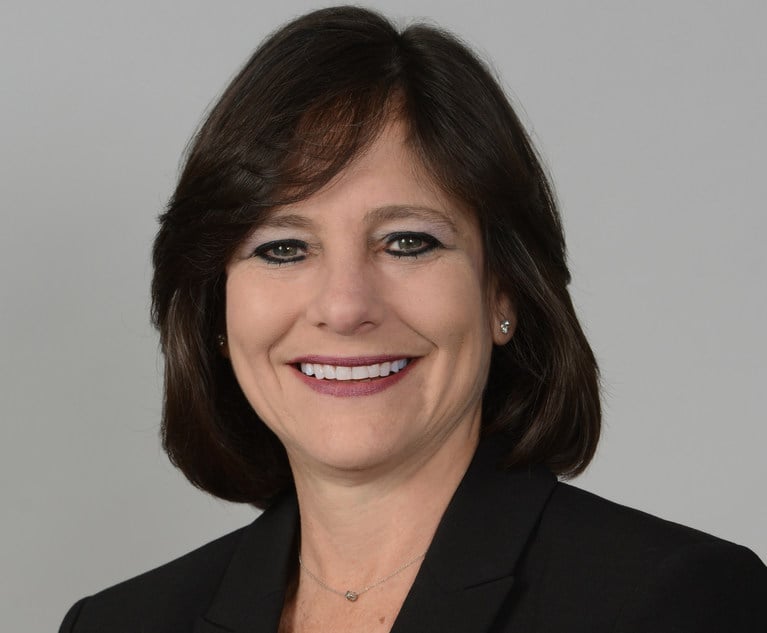 Gavin McInnes arrives at the Day for Freedom event in Whitehall, London. 2018.
Gavin McInnes arrives at the Day for Freedom event in Whitehall, London. 2018.Daily Dicta: Proud Boys Founder Sues Southern Poverty Law Center for Defamation (Good Luck With That)
You don't have to look hard to find the irony in a defamation lawsuit filed Monday by Proud Boys founder Gavin McInnes against the Southern Poverty Law Center.
February 05, 2019 at 12:14 PM
6 minute read
You don't have to look hard to find the irony in a defamation lawsuit filed Monday by Proud Boys founder Gavin McInnes against the Southern Poverty Law Center.
A conservative political commentator, McInnes objects that the SPLC labeled the Proud Boys—which at a press conference he described as “basically a pro-Trump drinking club”—as a hate group, allegedly causing him to lose employment opportunities, get kicked off Facebook, Twitter and Pay Pal, and be shunned by his neighbors in New York's upscale Westchester County.
“They cast this wide net of 'everyone's a Nazi' and they start destroying lives,” McInnes said at the press conference in front of the SPLC's headquarters in Alabama, where he was flanked by his legal team. Among his counsel: Ronald Coleman, the Mandelbaum Salsburg partner best known for his work on behalf of Asian-American rock band The Slants in its successful First Amendment/ trademark fight before the U.S. Supreme Court.
“This is about Americans being persecuted by a group that has seemingly unlimited power,” McInnes said of the non-profit legal organization. “They are replacing the government. They are becoming judge, jury and executioner.”
 First of all, I'm pretty sure the SPLC is not replacing the government.
First of all, I'm pretty sure the SPLC is not replacing the government.
And second, are you really going to insist on your right to express your opinions freely, but cry foul when others express their opinions of you?
In his 61-page complaint filed in U.S. District Court for the Middle District of Alabama, McInnes acknowledges that “the SPLC's hate designations are not empirical statements of fact.”
In other words, they're opinion.
But he protests that the SPLC's views are given too much weight—“treated by the mainstream press, law enforcement, courts and social media organizations not as SPLC's opinion but rather as objective, empirical factual determinations.”
Is that really SPLC's fault though? That its opinions are too influential?
In a statement, the SPLC shrugged off the suit. “Gavin McInnes has a history of making inflammatory statements about Muslims, women, and the transgender community. The fact that he's upset with SPLC tells us that we're doing our job exposing hate and extremism. His case is meritless.”
The SPLC on its website explains why it tagged Proud Boys as a hate group.
“[T]he Proud Boys are self-described 'western chauvinists' who adamantly deny any connection to the racist 'alt-right,' insisting they are simply a fraternal group spreading an 'anti-political correctness' and 'anti-white guilt' agenda,” the SPLC says. “Their disavowals of bigotry are belied by their actions: rank-and-file Proud Boys and leaders regularly spout white nationalist memes and maintain affiliations with known extremists. They are known for anti-Muslim and misogynistic rhetoric. Proud Boys have appeared alongside other hate groups at extremist gatherings like the 'Unite the Right' rally in Charlottesville.”
That said, there is precedent for the SPLC to back down from its hate designations.
In June of 2018, the civil rights group agreed to apologize and pay $3.4 million to British political activist Maajid Nawaz for including him and his organization, the Quilliam Foundation, on a 2016 list of anti-Muslim extremists.
“[A]fter getting a deeper understanding of their views and after hearing from others for whom we have great respect, we realize that we were simply wrong to have included Mr. Nawaz and Quilliam,” said SPLC President Richard Cohen in a statement. “Although we may have our differences with some of the positions that Mr. Nawaz and Quilliam have taken, we recognize that they have made important contributions to efforts to promote pluralism and that they are most certainly not anti-Muslim extremists.”
The apology seems to have emboldened others at odds with the SPLC.
In January, the anti-immigrant Center for Immigration Studies filed a racketeering suit against the SPLC for designating it a hate group. How the subjective designation could be considered fraudulent is unclear.
McInnes, who quit the Proud boys in November—two days after The Guardian reported the FBI categorized it as “an extremist group with ties to white nationalism” —didn't exactly take the high road in making his case against the SPLC.
First, he argued at the press conference that the group has cynically expanded its list of hate groups as a fundraising tool.
“I think the SPLC started out with noble intentions,” he said. “I think they started out trying to fight bigotry, trying to fight hatred, and we all feel the same way about that…And then, what I presume happened is, checks started pouring in, and they went 'Wow. This fighting hate thing is profitable…' Now when that is your business plan, you need to expand the net of hatred. It can't just be the KKK.”
For the record, I suspect that if SPLC lawyers were primarily motivated by making money, they wouldn't be working at the SPLC, where according to Glassdoor, the typical staff lawyer makes $77,829.
While McInnes on one hand portrayed the SPLC as practically omnipotent, “terrorizing people by telling them that we live in Nazi America” and “putting them in mortal danger,” he also inexplicably denigrated the organization for sounding “like a snarky babysitter named Becky.”
“We're at the behest of this bitchy teenager who is like, 'You're a Nazi because you didn't invite me to your birthday party,” he said, adopting a faux “Valley Girl” voice. “'And you're a Nazi. And you're like a homophobe. All you guys, you know what, you can't use Chase Bank anymore.' How did we get here? This is profoundly un-American. Becky is not the boss of us.”
Um, OK.
But neither are you.
This content has been archived. It is available through our partners, LexisNexis® and Bloomberg Law.
To view this content, please continue to their sites.
Not a Lexis Subscriber?
Subscribe Now
Not a Bloomberg Law Subscriber?
Subscribe Now
NOT FOR REPRINT
© 2025 ALM Global, LLC, All Rights Reserved. Request academic re-use from www.copyright.com. All other uses, submit a request to [email protected]. For more information visit Asset & Logo Licensing.
You Might Like
View All
Litigation Leaders: Jason Leckerman of Ballard Spahr on Growing the Department by a Third Via Merger with Lane Powell

Litigation Leaders: Greenspoon Marder’s Beth-Ann Krimsky on What Makes Her Team ‘Prepared, Compassionate and Wicked Smart’

Why the Founders of IP Boutique Fisch Sigler Are Stepping Away From the Law and Starting an AI Venture
Trending Stories
- 1The Importance of Contractual Language in Analyzing Post-Closing Earnout Disputes
- 2People in the News—Jan. 8, 2025—Stevens & Lee, Ogletree Deakins
- 3How I Made Partner: 'Avoid Getting Stuck in a Moment,' Says Federico Cuadra Del Carmen of Baker McKenzie
- 4Legal Departments Dinged for Acquiescing to Rate Hikes That 'Defy Gravity'
- 5Spalding Jurors Return $12M Verdict Against State Farm Insurance Client
Who Got The Work
Michael G. Bongiorno, Andrew Scott Dulberg and Elizabeth E. Driscoll from Wilmer Cutler Pickering Hale and Dorr have stepped in to represent Symbotic Inc., an A.I.-enabled technology platform that focuses on increasing supply chain efficiency, and other defendants in a pending shareholder derivative lawsuit. The case, filed Oct. 2 in Massachusetts District Court by the Brown Law Firm on behalf of Stephen Austen, accuses certain officers and directors of misleading investors in regard to Symbotic's potential for margin growth by failing to disclose that the company was not equipped to timely deploy its systems or manage expenses through project delays. The case, assigned to U.S. District Judge Nathaniel M. Gorton, is 1:24-cv-12522, Austen v. Cohen et al.
Who Got The Work
Edmund Polubinski and Marie Killmond of Davis Polk & Wardwell have entered appearances for data platform software development company MongoDB and other defendants in a pending shareholder derivative lawsuit. The action, filed Oct. 7 in New York Southern District Court by the Brown Law Firm, accuses the company's directors and/or officers of falsely expressing confidence in the company’s restructuring of its sales incentive plan and downplaying the severity of decreases in its upfront commitments. The case is 1:24-cv-07594, Roy v. Ittycheria et al.
Who Got The Work
Amy O. Bruchs and Kurt F. Ellison of Michael Best & Friedrich have entered appearances for Epic Systems Corp. in a pending employment discrimination lawsuit. The suit was filed Sept. 7 in Wisconsin Western District Court by Levine Eisberner LLC and Siri & Glimstad on behalf of a project manager who claims that he was wrongfully terminated after applying for a religious exemption to the defendant's COVID-19 vaccine mandate. The case, assigned to U.S. Magistrate Judge Anita Marie Boor, is 3:24-cv-00630, Secker, Nathan v. Epic Systems Corporation.
Who Got The Work
David X. Sullivan, Thomas J. Finn and Gregory A. Hall from McCarter & English have entered appearances for Sunrun Installation Services in a pending civil rights lawsuit. The complaint was filed Sept. 4 in Connecticut District Court by attorney Robert M. Berke on behalf of former employee George Edward Steins, who was arrested and charged with employing an unregistered home improvement salesperson. The complaint alleges that had Sunrun informed the Connecticut Department of Consumer Protection that the plaintiff's employment had ended in 2017 and that he no longer held Sunrun's home improvement contractor license, he would not have been hit with charges, which were dismissed in May 2024. The case, assigned to U.S. District Judge Jeffrey A. Meyer, is 3:24-cv-01423, Steins v. Sunrun, Inc. et al.
Who Got The Work
Greenberg Traurig shareholder Joshua L. Raskin has entered an appearance for boohoo.com UK Ltd. in a pending patent infringement lawsuit. The suit, filed Sept. 3 in Texas Eastern District Court by Rozier Hardt McDonough on behalf of Alto Dynamics, asserts five patents related to an online shopping platform. The case, assigned to U.S. District Judge Rodney Gilstrap, is 2:24-cv-00719, Alto Dynamics, LLC v. boohoo.com UK Limited.
Featured Firms
Law Offices of Gary Martin Hays & Associates, P.C.
(470) 294-1674
Law Offices of Mark E. Salomone
(857) 444-6468
Smith & Hassler
(713) 739-1250







